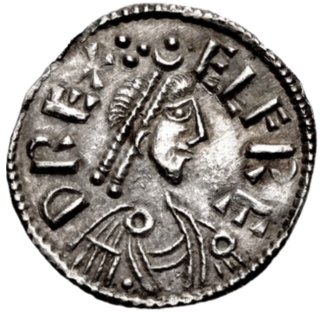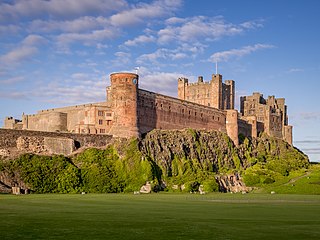Related Research Articles

Alfred the Great was King of the West Saxons from 871 to 886, and King of the Anglo-Saxons from 886 until his death in 899. He was the youngest son of King Æthelwulf and his first wife Osburh, who both died when Alfred was young. Three of Alfred's brothers, Æthelbald, Æthelberht and Æthelred, reigned in turn before him. Under Alfred's rule, considerable administrative and military reforms were introduced, prompting lasting change in England.
Ælfheah, more commonly known today as Alphege, was an Anglo-Saxon Bishop of Winchester, later Archbishop of Canterbury. He became an anchorite before being elected abbot of Bath Abbey. His reputation for piety and sanctity led to his promotion to the episcopate and, eventually, to his becoming archbishop. Ælfheah furthered the cult of Dunstan and also encouraged learning. He was captured by Viking raiders in 1011 during the siege of Canterbury and killed by them the following year after refusing to allow himself to be ransomed. Ælfheah was canonised as a saint in 1078. Thomas Becket, a later Archbishop of Canterbury, prayed to Ælfheah just before his murder in Canterbury Cathedral in 1170.

The Anglo-Saxons were a cultural group that inhabited much of what is now England in the Early Middle Ages, and spoke Old English. They traced their origins to Germanic settlers who came to Britain from mainland Europe in the 5th century. Although the details are not clear, their cultural identity developed out of the interaction of these settlers with the pre-existing Romano-British culture. Over time, most of the people of what is now southern, central, northern and eastern England came to identify as Anglo-Saxon and speak Old English. Danish and Norman invasions later changed the situation significantly, but their language and political structures are the direct predecessors of the medieval Kingdom of England, and the Middle English language. Although the modern English language owes somewhat less than 26% of its words to Old English, this includes the vast majority of words used in everyday speech.

Sweyn Forkbeard was King of Denmark from 986 until his death, King of England for five weeks from December 1013 until his death, and King of Norway from 999/1000 until 1013/14. He was the father of King Harald II of Denmark, King Cnut the Great, and Queen Estrid Svendsdatter.

Ragnar Lodbrok, according to legends, was a Viking hero and a Swedish and Danish king.

The Danelaw was the part of England in which the laws of the Danes held sway and dominated those of the Anglo-Saxons. The Danelaw contrasts with the West Saxon law and the Mercian law. The term is first recorded in the early 11th century as Dena lage. The areas that constituted the Danelaw lie in northern and eastern England, long occupied by Danes and other Norsemen.

The Norsemen were a North Germanic ethnolinguistic group of the Early Middle Ages, during which they spoke the Old Norse language. The language belongs to the North Germanic branch of the Indo-European languages and is the predecessor of the modern Germanic languages of Scandinavia. During the late eighth century, Scandinavians embarked on a large-scale expansion in all directions, giving rise to the Viking Age. In English-language scholarship since the 19th century, Norse seafaring traders, settlers and warriors have commonly been referred to as Vikings. Historians of Anglo-Saxon England distinguish between Norse Vikings (Norsemen) from Norway, who mainly invaded and occupied the islands north and north-west of Britain, as well as Ireland and western Britain, and Danish Vikings, who principally invaded and occupied eastern Britain.
Guthrum was King of East Anglia in the late 9th century. Originally a native of Denmark, he was one of the leaders of the "Great Summer Army" that arrived in Reading during April 871 to join forces with the Great Heathen Army, whose intentions were to conquer the kingdoms of Anglo-Saxon England. The combined armies were successful in conquering the kingdoms of East Anglia, Northumbria, and parts of Mercia, and overran Alfred the Great's Wessex, but were ultimately defeated by Alfred at the Battle of Edington in 878. The Danes retreated to their stronghold, where Alfred laid siege and eventually Guthrum surrendered.

At the Battle of Edington, an army of the kingdom of Wessex under Alfred the Great defeated the Great Heathen Army led by the Dane Guthrum on a date between 6 and 12 May 878, resulting in the Treaty of Wedmore later the same year. Primary sources locate the battle at "Eðandun". Until a scholarly consensus linked the battle site with the present-day village of Edington in Wiltshire, it was known as the Battle of Ethandun. This name continues to be used.

A fyrd was a type of early Anglo-Saxon army that was mobilised from freemen or paid men to defend their Shire's lords estate, or from selected representatives to join a royal expedition. Service in the fyrd was usually of short duration and participants were expected to provide their own arms and provisions.

Bamburgh Castle is a castle on the northeast coast of England, by the village of Bamburgh in Northumberland. It is a Grade I listed building.
Grandpont is a mainly residential area in south Oxford. It is west of Abingdon Road, and consists mainly of narrow streets that run at right angles to the main road, with terraced late-Victorian and Edwardian houses.

The Great Heathen Army, also known as the Viking Great Army, was a coalition of Scandinavian warriors who invaded England in AD 865. Since the late 8th century, the Vikings had been engaging in raids on centres of wealth, such as monasteries. The Great Heathen Army was much larger and aimed to conquer and occupy the four kingdoms of East Anglia, Northumbria, Mercia and Wessex.
The English people are an ethnic group and nation native to England, who speak the English language, a West Germanic language, and share a common history and culture. The English identity began with the Anglo-Saxons, when they were known as the Angelcynn, meaning race or tribe of the Angles. Their ethnonym is derived from the Angles, one of the Germanic peoples who migrated to Britain around the 5th century AD.
Janina Sara Maria Ramirez, sometimes credited as Nina Ramirez, is a British art historian, cultural historian, and TV presenter. She specialises in interpreting symbols and examining works of art within their historical context.

Alfred the Great was an Anglo-Saxon king (871–899) of Wessex, an Anglo-Saxon kingdom that existed from 519 to 927 south of the river Thames in England. In the late 9th century, the Vikings had overrun most of the Anglo-Saxon kingdoms that constituted England at the time. Alfred's reign has become regarded as pivotal in the eventual unification of England, after he famously defended Wessex and southern England against the Viking invasions, winning a decisive victory at the Battle of Edington in 878.

William John Blair, is an English historian, archaeologist, and academic, who specialises in Anglo-Saxon England. He is Emeritus Professor of Medieval History and Archaeology at the University of Oxford, and a Fellow of The Queen's College, Oxford. He gave the 2013 Ford Lectures at the University of Oxford.

The Last Kingdom is a British historical fiction television series based on Bernard Cornwell's The Saxon Stories series of novels. The series was developed for television by Stephen Butchard and premiered on 10 October 2015 on BBC Two. For the second season, Netflix co-produced the series. In 2018, the series was acquired by Netflix, which continued the series for three more seasons. The series concluded on 9 March 2022 after five seasons for a total of 46 episodes. A feature-length sequel that concluded the series story, titled Seven Kings Must Die, premiered on 14 April 2023 on Netflix.
The Battle of York was fought between the Vikings of the Great Heathen Army and the Anglo-Saxon Kingdom of Northumbria on 21 March 867 in the city of York.
Elżbieta Temple, properly Elżbieta Klewin née Malcz, was a scholar and writer specialising in the field of illuminated manuscripts who produced two books, the second co-authored with J. J. G. Alexander.
References
- 1 2 "Dr Eleanor Parker - Brasenose College, Oxford". www.bnc.ox.ac.uk. Retrieved 5 February 2020.
- ↑ "Eleanor Parker | History Today". www.historytoday.com. Retrieved 5 February 2020.
- ↑ Thurber, Bev (18 January 2019). "19.08.10 Parker, Dragon Lords". The Medieval Review. ISSN 1096-746X.
- ↑ "Dragon Lords: Dr Eleanor Parker on England's Viking Myths and Ragnar Lothbrok | All About History". www.historyanswers.co.uk. 4 June 2018. Retrieved 5 February 2020.
- ↑ Carey, John (6 February 2022). "Conquered by Eleanor Parker review — Anglo-Saxon life after the Norman conquest". The Times . Retrieved 25 February 2022.
- ↑ Burghart, Alex (5 March 2022). "What the Anglo-Saxons made of 1066 and all that followed". The Spectator . Retrieved 8 March 2022.
- ↑ Foot, Sarah (19 August 2022). "Conquered: The last children of Anglo-Saxon England by Eleanor Parker". Church Times . Retrieved 26 August 2022.
- ↑ Ward, Emily J. (25 March 2022). "Altered fortunes". The Times Literary Supplement . Retrieved 26 August 2022.
- ↑ Holgate, Andrew; Millen, Robbie (4 March 2022). "The best books of 2022". The Times . Retrieved 11 March 2022.
- ↑ Hughes, Kathryn (25 August 2022). "Winters in the World by Eleanor Parker review – a dive into the Anglo-Saxon year". The Guardian . Retrieved 25 August 2022.
- ↑ Howse, Christopher (27 August 2022). "Sacred Mysteries: Tree and leaf in the green of the year and the fallow". Daily Telegraph . Retrieved 27 August 2022.
- ↑ Connelly, Charlie (15 December 2022). "Tales from a lush life: the non-fiction books of the year". The New European . Retrieved 23 December 2022.
- ↑ DeGroot, Gerard; Sandbrook, Dominic (26 November 2022). "25 best history books of 2022". The Times . Retrieved 26 November 2022.
- ↑ Davies, Rhiannon (2 December 2022). "21 best books for history lovers: BBC History Magazine's Books of the Year 2022". BBC History . Retrieved 7 December 2022.
- ↑ Young, Francis (May 2023). "Briefly Noted". First Things . Retrieved 17 April 2023.
- ↑ "A Clerk of Oxford: About this blog". A Clerk of Oxford. Retrieved 5 February 2020.
- ↑ "A Clerk of Oxford | History Today". www.historytoday.com. Retrieved 5 February 2020.
- ↑ Howse, Christopher (4 July 2015). "A Clerk of Oxford's guide to a bright old world". ISSN 0307-1235 . Retrieved 5 February 2020.
- ↑ "BBC World Service – The Forum, Cnut: England's Viking king, The Viking's bloodthirsty Skaldic poetry". BBC. Retrieved 5 February 2020.